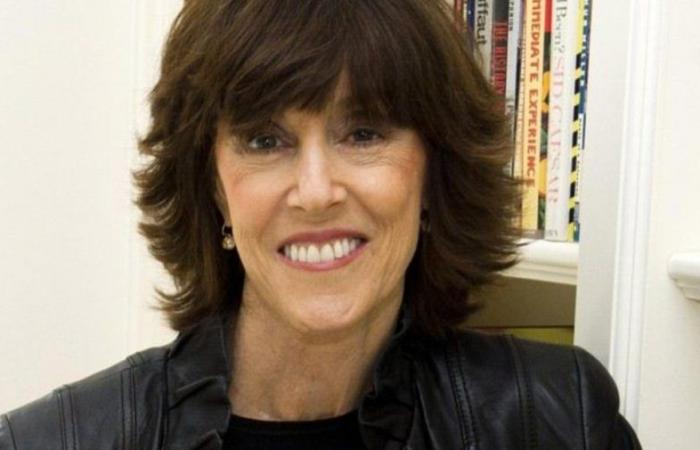The publishing industry, almost always tied to novelty, offers from time to time book rescues whose relevance transcends the moment of writing, often after the death of the authors. These “operations” have created real fashions –for example, the remembered phenomenon, after the publication of Sándor Márai’s books–. They are also books that are translated for the first time, and, in that sense, they function as novelties for the reader of the language into which it is translated. This is the case of the recently published I don’t like my neck (original from 2006), from the writer, screenwriter, and director Nora Ephronwhich together with I do not remember anything (2010), are rescued and translated by the Spanish label Libros del Asteroid. Nora Ephron died of leukemia in 2012at 72 years old, young, and fully active.
In Argentina, we know (and love) Ephron, above all, for his great romantic comediesmainly the three starring Meg Ryan: When Harry met Sally (with Billy Cristal), love tune and You have an email (with Tom Hanks)–, but not so much for his bookss. Not even for his career journalistic who started early as “the mail girl” in Newsweekbut with only thirty years already was included on the cover of the magazine’s 40 years esquire (1973), alongside Hemingway, Faulkner, Philip Roth and Gay Taleseamong other celebrities, something she herself would become in the United States.
For men and about women
When the historic media “for men” asked the rising journalist what she wanted to write about, she responded: “About women!” It wasn’t so obvious back then… So, like a “Carrie Bradshow” forward the letter, and in parallel to the second feminist waveshe would become a journalist with her own voice: a lucid and fun observer, sometimes acidic, but also honest and vulnerable.
Ephron would also become famous for write from the materials that life itself gave you, not always happy: like the alcoholism of his parents – who had been Hollywood screenwriters, where the whole family had moved, and where they would spend their childhood years. Or when she brought to fiction her resounding (or explosive) divorce from journalist Carl Bernstein, the Watergate caseupon finding out that she was unfaithful, with a small child and a seven-month pregnancy.
Following the mantra that her mother repeated to her since she was a child, “Everything is a copy”, and through therapy, She chose to move away from the place of victim, to laugh at herself and made his discharge by writing the novel The cake is over (Anagrama), a best-seller that would reach the cinema, embodied by another favorite duo: Meryl Strip-Jack Nicholson. Shaking out the hornet’s nest was his way of empowering himself, of taking control over life’s events.
In the brief essays and articles collected in I don’t like my neckEphron reviews some of what have been her favorite topics, Dive into memories, write the story of your life “in just under 3,500 words.”
This journalistic jargon largely reflects the way in which the world was recorded: as something to tell, always with the hilarious and sagacious tone that made her famous. The themes – more or less superficial – seem to be excuses: the choice of a handbag, the secrets of good food (and fashionable chefs), the contemporary tragedy of the time and money we dedicate to the “maintenance” of the body, the search desperate for the “lost cabbage strudel” of the 80s that, like a Proustian madeleine, is no longer available in New York.
Actually, The entire book has a slight nostalgic tone behind it., of “I confess that I have lived”, the question about the passage of time, or what time does with our memories – and our bodies. All together, all at once, in a perfect bittersweet that constantly takes us, from the trivial to the human, from the banal to empathy, or to plain and simple resignation.
Reading Nora Ephron makes you want to draw lines of kinship: as Woody Allenwas another Jewess in love with New York – perhaps Manhattan and When Harry Met Sally are two of the most beautiful records that the cinema of the Big Apple has given us. Fran Lewobitzshe couldn’t imagine living anywhere else (she once did, for her husband’s job, and the experiment logically failed).
As both, life could not be understood without humor. In “Turn the Page,” the longest of the texts in the book, Ephron narrates how two months after her separation from Bernstein fell in love… with Apthorpan apartment on the Upper West Side of Manhattan. The chronicle of this ten-year “relationship” allows him to sketch a brief history of New York through its inhabitants, its economic crises, its migrations, its charm, its habits and customs.
“I sincerely believed that, at the worst moment of my adult life, a building had saved me”. In “On Maintenance” and “I Don’t Like My Neck,” suppurates its rebellion to those who claim the benefits of old age: “What are they thinking about? Don’t they have a neck?”
In “Parenting in Three Sentences,” he casts spells on the concept of parentingthat newcomer to psychology who, allied with a certain feminism, urged parents to face the task of “molding” their children: “Raising a child was not just taking care of him, but transforming himforcibly fatten it like a duck’s liver, alter it, modify it, modulate it, manipulate it, soften it, improve it.”
Ephron defined herself as an avid reader –“Reading is one of my main activities. Reading is everything” – she loved good food (and good chefs, whom she pursued, and for whom she became a fanatic). She came to cinema from journalism. He created, in his own way, “literature of the self” and shamelessly gave self-help advice, as he notes, with honesty and self-confidence, in that kind of farewell that is: “Things I would like to have known,” “People only have one way of being”, “Never marry a man you would not like to divorce”, “When children reach adolescence, it is important to have a dog, so that someone at home will be happy to see you”. But along with humor, there was also awareness of the ephemeral: “keep a diary, take more photos, write everything down.”
I continue to trace kinships, I think now of the locals. comes to mind Cecilia Absatzformerly a journalist for women’s magazines, publicist, film and series critic, and currently, in charge of the newsletter “Viejo Smoking”, to think about (new) old age, owner of biting humor and exquisite prose. She and Ephron would have been good friends. Or at least, sparks would have been raised.
I don’t like my neckby Nora Ephron (Asteroide Books).






